Table of Contents
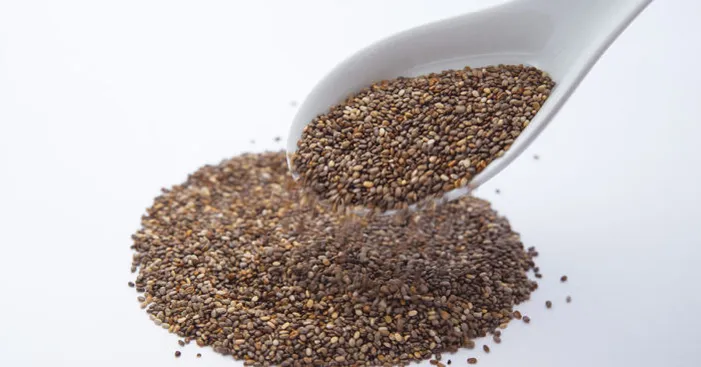
Chia seeds nutrition data are out of the ordinary as it offers a large number of nutrients in just a few tablespoons.
In fact, 20% of chia seeds weight comes from omega 3 fatty acids which are more than the amount in flaxseeds for the same serving. (1)
Many specialists recommend chia seeds for their protective properties in case of cardiovascular diseases.
Chia seeds have 2 times more potassium than bananas, 4 times more calcium than milk, and almost the same amount of Iron as a beef liver. (2)
It is also a great source of fibers with a very good water absorption up to 12 times their weight in water.
It is one of the plant-based products that help vegans and vegetarians meet their daily needs in many essential nutrients.
Chia seeds nutrition data:
Usually, food calories and nutritional data are counted for a serving size of 1 cup, 3.5 ounces, or a handful (1ounce) but it’s not the same for chia seeds.
As the recommended dose is no more than 2 to 3 tbsp per day, here are the chia seeds nutrition data in 2 tbsp:
Chia seeds calories 2 tbsp:
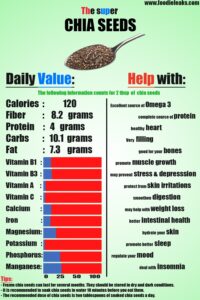
These data count for 2 tbsp (26g) of chia seeds: (3)
- Calories: 120
- Fat: 7.3g
- Protein: 4g
- Fibers: 8.2 g
- Carbs: 10.1 g
- B1 vitamin: 13.2%
- B3 vitamin: 14.6%
- A vitamin: 0.4%
- C vitamin: 0.7%
- Calcium: 13.6%
- Iron: 12.4%
- Magnesium: 22%
- Potassium: 2.6%
- Phosphorus: 29%
- Manganese: 31.2%
Imagine finding all of these nutrients in just 2 tablespoons!
Sure chia seeds are not the most flavorful seed to eat, but they are definitely one of the healthiest snacks you could have between meals.
Two tbsp. of chia seeds throughout the day at two different times will provide your body with many nutrients, smoothen your digestion, make you feel full with just 120 calories!
What are the health benefits of this so-called “super seed”?
Chia seeds health benefits:
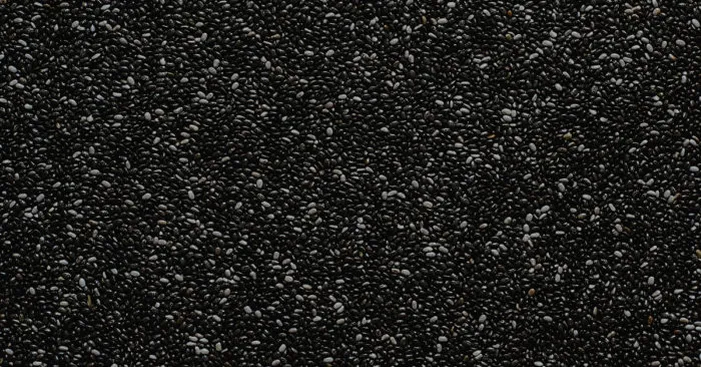
A good source of protein:
Chia seeds are a really good source of protein as they contain 15.4g per 3.5 ounces (100g).
Unlike peanuts, chia seeds contain a complete source of protein which means they contain all the 9 essential amino acids our bodies need. (4)
This is usually rare to find in vegetarian protein but with moderate consumption of chia seeds, you wouldn’t need other food as you already get complete protein with chia seeds.
Good for your heart:
Several studies have confirmed that chia seeds can drop blood pressure, reduce cholesterol, and protect from clogs in blood vessels. (5)
It is because these seeds are rich in omega-3 fatty acids, potassium, and magnesium that makes them very beneficial for a healthy heart.
Studies on mice show that chia seeds can reduce the risk of chronic diseases by increasing good cholesterol (HDL). (6)
In addition, chia seeds significantly reduce blood pressure which is beneficial for those dealing with high blood pressure.
Therefore, chia seeds are beneficial to heart health once you include them in a healthy diet.
Richer in calcium than milk:
Milk is usually portrayed as the richest food in calcium but that is not correct!
Chia seeds contain much more calcium, magnesium, and potassium than milk.
Even though consumed in smaller portions compared to milk, chia seeds contain 4 times more calcium than milk with 630mg per 3.5 ounces. (7)
Calcium is really beneficial for the bones, the heart, and the muscles.
Help deal with stress and insomnia:
One of the amino acids found in chia seeds protein is called tryptophan. (8)
This amino acid is capable of producing melatonin and serotonin, two hormones that help us regulate our mood, relax, and have better sleep.
These two hormones are also proven to help against stress and depression.
Ensure your skin is hydrated:
Eating regular doses of chia seeds will help nurture your skin.
It is due to the omega-3 fatty acids found in chia seeds which smoothen your skin and give it a better elasticity. (9)
Chia seeds have also been recommended for people who deal with skin irritations.
Better intestinal health:
Chia seeds are very rich in fibers which are necessary for optimum digestion.
Fibers are very efficient as they smoothen digestion and reduce stomach acidity.
For people who don’t include a lot of fiber in their diet, nutritionists recommend introducing soaked chia seeds gradually into their diet. (10)
Helps with weight loss:
Chia seeds have mucilaginous properties which means when exposed to liquids they form gel sacks around themselves.
When exposed to stomach liquids, chia seeds absorb up to 15 times their weight in water.
This property and the fiber content of chia seeds ensure a longer feeling of fullness and less feeling of hunger which definitely help with weight loss. (11)
Lowers blood sugar level:
The high blood sugar level is a bad symptom for type 2 diabetes and other chronic diseases including heart disease.
However, a temporary rise in blood sugar levels after meals may be harmful even for healthy people.
Several studies show the effectiveness of chia seeds in increasing insulin sensitivity and blood sugar control. (12)
For instance, bread that contains chia seeds (unlike regular bread) reduces blood sugar levels.
Reduces inflammation:
Inflammation is the result of an immune system response to a certain infection.
Even though it is a totally normal response, it can still be chronic in some cases.
There are several habits that can increase the risk of chronic infections such as lack of exercise, poor diet, and smoking.
Also, a 3-months study of 20 diabetic people showed that consuming 4 tbsps of chia seeds daily reduced their chronic infections by 40%. (13)
Prevents osteoporosis:
Chia seeds are full of minerals including calcium, zinc, phosphorus, all of which are necessary for healthy teeth and bones.
Osteoporosis is mostly linked with aging and a regular intake of those minerals would reduce its occurrence.
Also, since vegans don’t have enough calcium, nutritionists recommend consuming chia seeds as an alternative to nurture the bones. (14)
Treats metabolic syndrome:
Metabolic syndrome is a malnutrition condition that is the result of non-friendly diets.
This condition can result in many health issues such as heart disease, diabetes, obesity…
People who suffer from metabolic syndrome need to work on their diets in order to provide the essential nutrients and reduce harmful ones.
Therefore, consuming 3 to 4 tbsps of chia seeds a day is one of the best natural treatments to meet the daily needs.
The health benefits of chia seeds are numerous but in some cases, even though very rare, they can cause severe health issues.
Is there a difference in chia seeds nutrition data based on color?
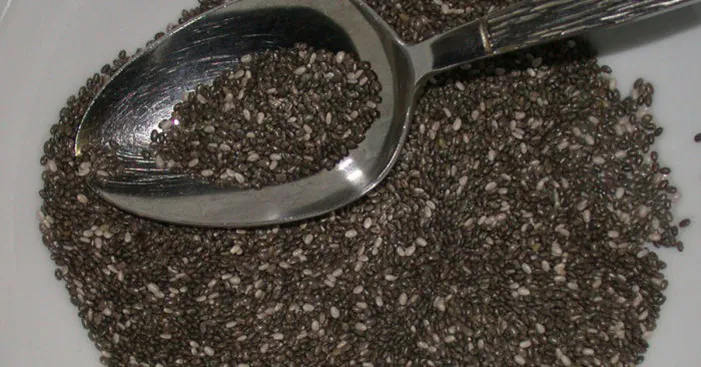
Chia seeds are either black or white, however, is there a difference in terms of the nutritional value?
They have other differences but they have almost the exact same nutrition data.
Among the differences between black and white chia seeds: (15)
- Black chia seeds come from plants with purple flowers and the white ones come from white flowers.
- White chia seeds are good for dessert recipes as they don’t have a color, unlike black seeds which are better for baking.
- White chia seeds are rarer than black seeds and therefore they are more expensive.
The main difference is for aesthetic preferences for example Asians like white seeds, unlike Europeans who prefer black seeds.
However, speaking of chia seeds color you can find brown chia seeds in the market but that is a sign of immaturity.
It could be due to a lack of water or a damaging climate event that chia seeds stayed brown and didn’t mature fully.
Consuming Chia seeds:
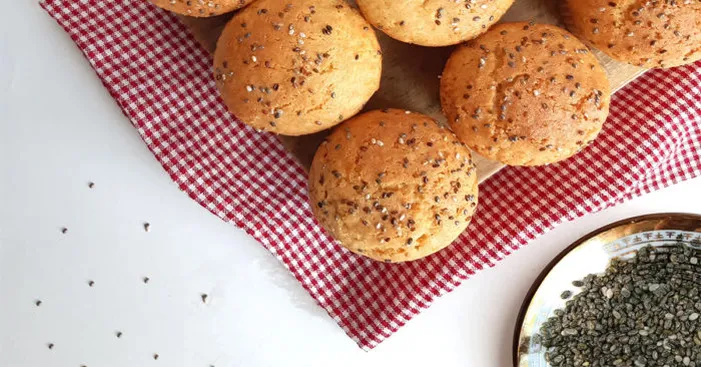
Chia seeds are very easy to incorporate into any recipe to benefit from their nutritional virtues.
This is because they have a very bland taste which is why they can go unnoticed in almost any recipe.
In addition, you don’t necessarily have to ground them like flaxseeds and that makes them super easy to use.
For instance, we can eat chia seeds raw, add them to desserts, bread, muffins, or even juices.
You can also sprinkle them on yogurts, cereals, salads, and rice dishes.
Thanks to their ability to absorb fats and water then turn into a gel form, they are a great substitute for eggs and can also thicken sauces.
If you are out of eggs, just soak 1 tbsp of chia seeds with 3 tbsps of water for 15 minutes and use them instead.
You can even prepare chia seeds gel by mixing 1 cup of seeds with 3 cups of water, storing them in the fridge, it will be edible for 2 weeks.
Buying chia seeds:
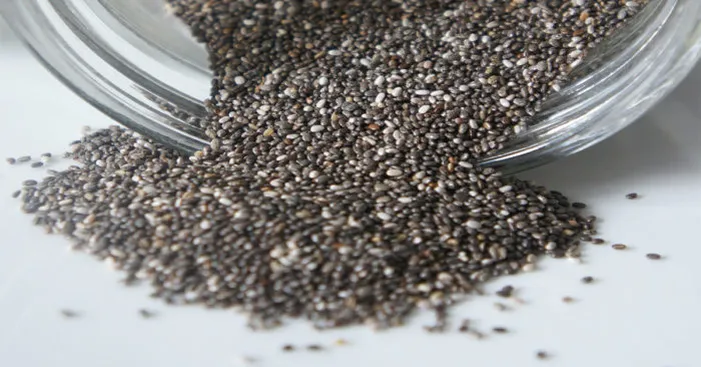
When buying chia seeds, be aware of brown seeds as that is a sign of immaturity or lack of watering.
Even though brown chia seeds are not harmful they are certainly inferior to black or white seeds in terms of their nutrition data.
Mature chia seeds can be black or white with the same nutritional data and a slightly more pronounced for black seeds.
- It is always better to choose organically grown chia seeds to avoid possible pesticide residues.
- Also, try to look for chia seeds that come from fair trading channels to guarantee a fair income for the producers.
- Choose chia seeds that come from Central and South America specifically from Bolivia, Mexico, Argentino, Peru…
- Those usually have a very high quality and they are still cultivated in a traditional manner.
- Whether you buy chia seeds powder, oil, whole seeds just make sure the sub-product is 100% natural without additives.
Storing chia seeds:
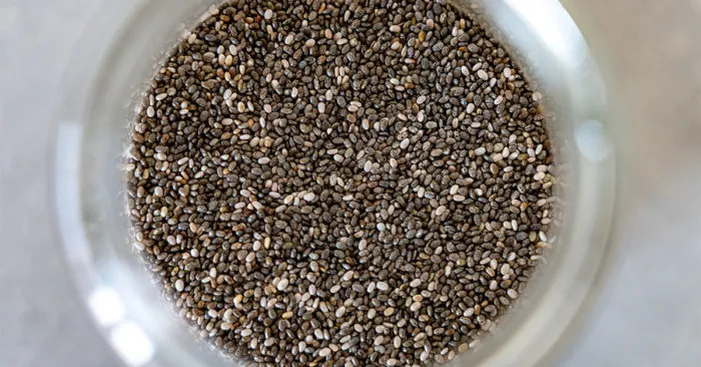
Chia seeds can go bad and the best way to figure that is to examine and smell them.
Expired chia seeds tend to grow mold and have an unpleasant pronounced smell.
However, it is unlikely that you could have your chia seeds go bad if you store them properly.
Like most dry seeds, chia seeds have a long lifespan once you store them in the right conditions.
In fact, if you keep chia seeds away from humidity and light you can even keep them at room temperature for 2 years.
To do that, you can put them in a glass jar and in your kitchen pantry and they will remain fresh.
If you want to extend its lifespan, you can pour chia seeds in an air-tight container and place them in the fridge for up to 4 years.
You can also place them in a freezing bag and they will retain their optimal quality for 4 years and remain edible beyond that time.
References:
(1): Chia Seeds: How Healthy Are They? (webmd.com)
(2): Do chia seeds have more potassium than bananas? – Goldfoods (goldfoodsusa.com)
(3): FoodData Central (usda.gov)
(4): Chia: The Power of a Complete Protein – dummies
(5): Nutritional and therapeutic perspectives of Chia (Salvia hispanica L.): a review (nih.gov)
(6): Chia Seeds Effect on Cholesterol (verywellhealth.com)
(7): Calcium Rich Foods: Foods that contain more calcium than a glass of milk (indiatimes.com)
(8): 22 Tryptophan Rich Foods To Help Your Rest And Mood | Food For Net
(9): Hydration, Water and … Chia Seeds? | AquAid UK (aquaidwatercoolers.co.uk)
(10): Chia Seeds and Thier Digestive Benefits (monq.com)
(11): Chia Seeds and Weight Loss: Are They Effective? (healthline.com)
(12): Dietary chia seed (Salvia hispanica L.) rich in alpha-linolenic acid improves adiposity and normalises hypertriacylglycerolaemia and insulin resistance in dyslipaemic rats – PubMed (nih.gov)
(13): Chia Seeds, Diabetes – Diabetes Self-Management (diabetesselfmanagement.com)
(14): Osteoporosis And Bone Health: Milk And Other Calcium Rich Foods To Enhance Bone Health (ndtv.com)
(15): White VS Black Chia Seeds – What’s The Difference? – Ayoub’s Dried Fruits & Nuts (ayoubs.ca)
